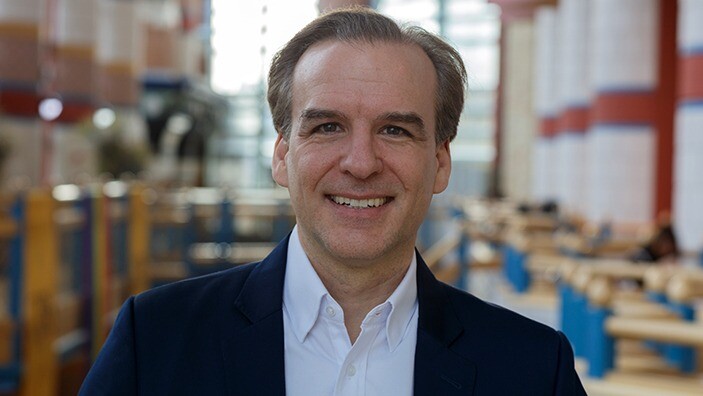Professor of Leadership
BA, MA (University of Heidelberg), PhD (University of St Gallen)
My research interests include the social dynamics between leaders and followers. I examine, for example, how charismatic leaders affect followers, how emotions spread through organisations, and how leaders build emotional intelligence into organisational systems. My research relies on experimental, archival, survey and field studies. I’m a member of the Organisational Behaviour subject group at Cambridge Judge Business School, which aspires to promote our understanding of behaviour within organisations and translate our scientific research into practical applications.

Professional experience
Jochen’s research has been published in top-tier academic outlets such as the Academy of Management Journal, Organization Science, Journal of Applied Psychology, and Journal of Personality and Social Psychology. He regularly writes for Harvard Business Review and his discoveries have been featured in 2 TEDx talks and the media around the world, for example, by the BBC, CNN, The Economist, The Financial Times, Le Monde, The New York Times, NPR, The Wall Street Journal, and Die Zeit.
In his research, teaching and consulting, Jochen has worked with a diverse set of companies and organisations including the Adecco Group, the Boston Consulting Group, British Telecom, Daimler, easyJet, the European Commission, Google, Grey, Jaguar Land Rover, L’Oréal, Media Arts Lab, Microsoft, Nordea, Rolls-Royce, Trivago, the UK’s Cabinet Office, and the World Bank. As a co-founder of the Global HR Valley, a future-of-work ecosystem that is part of the Reskilling Revolution of the World Economic Forum, he builds a platform together with prominent businesses, organisations and governments to prepare leaders and organisations for a changing world of work.
Jochen has lectured at all academic levels and received multiple best teacher awards. He has also taught at startup incubators such as Plug and Play in Silicon Valley and the Venture Café Foundation in Boston, as well as at prestigious military academies, such as the Royal Military Academy Sandhurst in the UK and the Center for Leadership in Germany. Jochen is amongst the founders of the Experimental Laboratory at Cambridge Judge Business School. He is an Associate Editor for the Academy of Management Discoveries and a member of the Editorial Board of The Leadership Quarterly; previously, he was a Consulting Editor for Emotion and served on the Editorial Board of the Academy of Management Journal. He is a Subject Matter Expert of the Academy of Management and an executive board member of the International Society for Emotional Intelligence. He is also an expert member for the Emotion Revolution in the Workplace project by the Yale Center for Emotional Intelligence.
Previous appointments
Jochen’s primary appointment is with the University of Zurich, Switzerland, where he is a Full Professor, holds the Chair of Human Resource Management and Leadership, and serves as the Director of the Center for Leadership in the Future of Work. Previously, Jochen held the Chair of Leadership and HRM at WHU – Otto Beisheim School of Management in Düsseldorf, Germany; was a Research Associate at the Institute for Leadership and Human Resource Management at the University of St Gallen, Switzerland; and was a Visiting Scholar at the Graduate School of Arts and Science at Yale University in the United States.
Publications
Selected publications
- Landis, B., Fisher, C.M. and Menges, J.I. (2022) “How employees react to unsolicited and solicited advice in the workplace: implications for using advice, learning, and performance.” Journal of Applied Psychology, 107(3): 408-424 (DOI: 10.1037/apl0000876)
- Jachimowicz, J.M., Lee, J., Staats, B., Gino, F. and Menges, J.I. (2021) “Between home and work: commuting as an opportunity for role transitions.” Organization Science, 32(1): 64-85 (DOI: 10.1287/orsc.2020.1370)
- Landis, B., Kilduff, M., Menges, J.I. and Kilduff, G. (2018) “The paradox of agency: feeling powerful reduces brokerage opportunity recognition yet increases willingness to broker.” Journal of Applied Psychology, 103(8): 929-938 (DOI: 10.1037/apl0000299)
- Knight, A., Menges, J.I. and Bruch, H. (2018) “Organizational affective tone: a meso perspective on the origins and effects of consistent affect in organizations.” Academy of Management Journal, 61(1): 191-219 (DOI: 10.5465/amj.2016.0671)
- Conroy, S., Becker, W. and Menges, J.I. (2017) “The meaning of my feelings depends on who I am: work-related identifications shape emotion effects in organizations.” Academy of Management Journal, 60(3): 1071-1093 (DOI: 10.5465/amj.2014.1040)
- Menges, J.I., Tussing, D., Wihler, A. and Grant, A. (2017) “When job performance is all relative: how family motivation energizes effort and compensates for intrinsic motivation.” Academy of Management Journal, 60(2): 695-719 (DOI: 10.5465/amj.2014.0898)
Journal articles
- Lebel, R.D. and Menges, J. (2026) “Beyond positivity: a review of the functional outcomes of negative emotions at work.” Journal of Occupational Health Psychology (DOI: 10.1037/ocp0000422) (forthcoming)
- McGuire, J., McAllister, D.J., Menges, J.I. and De Cremer, D. (2026) “The power and peril of awe in leadership: transforming follower identity and behavior.” Academy of Management Review (DOI: 10.5465/amr.2022.0282) (published online Mar 2025)
- Howe, L.C. and Menges, J.I. (2025) “Pitch imperfect: how investors respond to entrepreneur disclosure of personal flaws.” Organizational Behavior and Human Decision Processes, 186: 104388 (DOI: 10.1016/j.obhdp.2024.104388)
- McGuire, J., Bastardoz, N., Hentrup, L.J., De Cremer, D. and Menges, J.I. (2025) “The backdrop of leadership: how environmental awe influences charisma attributions.” Journal of Organizational Behavior, 46(4): 580-602
- van Zelderen, A.P.A., Masters-Waage, T.C., Dries, N., Menges, J. and Sanchez, D.R. (2025) “Simulating virtual organizations for research: a comparative empirical evaluation of text-based, video, and virtual reality video vignettes.” Organizational Research Methods, 28(3): 457-486 (DOI: 10.1177/10944281241246770)
- van Zelderen, A.P.A., Wu, S., Koszo, G. and Menges, J.I. (2025) “When AI gets personal: employee emotional responses to anthropomorphic AI agents in a virtual workspace.” Computers in Human Behavior: Artificial Humans, 5: 100189 (DOI: 10.1016/j.chbah.2025.100189)
- Vongswasdi, P., Leroy, H., Menges, J.I. and Le, J. (2025) “Uncomfortable but developing: how mindfulness moderates the impact of negative emotions on learning.” Academy of Management Learning and Education, 24(2): 197-223 (DOI: 10.5465/amle.2023.0434)
- Ward, G., Schwartz, A.H., Giorgi, S., Menges, J. and Matz S.C. (2025) “The role of negative affect in shaping populist support: converging field evidence from across the globe.” American Psychologist, 80(3): 323-344 (DOI: 10.1037/amp0001326)
- Howe, L.C., Giurge, L.M., Wagner, A.F. and Menges, J.I. (2024) “CEOs showing humanity: seemingly generic human care statements in conference calls and stock market performance during crisis.” Academy of Management Discoveries. 10(4): 589-610 (DOI: 10.5465/amd.2021.0225)
- Howe, L.C. and Menges, J.I. (2024) “How family motivates people to do their best work.” Harvard Business Review, 3 July
- Menges, J.I., Howe, L.C., Hall, E., Jachimowicz, J.M., Parker, S.K., Takeuchi, R., Vadera, A.K., Whillans, A. and Cohen, S.K. (2024) “From the Guest Editors.” Academy of Management Discoveries, 10(3): 307-318 (DOI: 10.5465/amd.2024.0213)
- Mo, C.H., Jachimowicz, J.M., Menges, J.I. and Galinsky, A.D. (2024) “The impact of incidental environmental factors on vote choice: wind speed is related to more prevention-focused voting.” Political Behavior, 46: 1417-1442 (DOI: 10.1007/s11109-023-09865-y)
- van Zelderen, A.P.A., Dries, N. and Menges, J. (2024) “The curse of employee privilege: harnessing virtual reality technology to inhibit workplace envy.” Frontiers in Virtual Reality, 5: 1260910 (DOI: 10.3389/frvir.2024.1260910)
- Decoster, S., De Schutter, L., Menges, J., De Cremer, D. and Stouten, J. (2023) “Does change incite abusive supervision? The role of transformational change and hindrance stress.” Human Resource Management Journal, 33(4): 957-976 (DOI: 10.1111/1748-8583.12494)
- Kammerlander, N., Menges, J., Herhausen, D., Kipfelsberger, P. and Bruch, H. (2023) “How family CEOs affect employees’ feelings and behaviors: a study on positive emotions.” Long Range Planning, 56(5): 102209 (DOI: 10.1016/j.lrp.2022.102209)
- Blickle, G., Kranefeld, I., Wihler, A., Kückelhaus, B.P. and Menges, J.I. (2022) “It works without words: a nonlinguistic ability test of perceiving emotions with job-related consequences.” European Journal of Psychological Assessment, 38(3): 210-223 (DOI: 10.1027/1015-5759/a000656)
- Howe, L.C. and Menges, J.I. (2022) “Remote work mindsets predict emotions and productivity in home office: a longitudinal study of knowledge workers during the COVID-19 pandemic.” Human-Computer Interaction, 37(6): 481–507 (DOI: 10.1080/07370024.2021.1987238)
- Howe, L.C., Jachimowicz, J.M. and Menges, J.I. (2022) “To retain employees, support their passions outside work.” Harvard Business Review, 30 March 2022
- Landis, B., Fisher, C.M. and Menges, J.I. (2022) “How employees react to unsolicited and solicited advice in the workplace: implications for using advice, learning, and performance.” Journal of Applied Psychology, 107(3): 408-424 (DOI: 10.1037/apl0000876)
- Taylor, C.L., Ivcevic, Z., Moeller, J., Menges, J.I., Reiter-Palmon, R. and Brackett, M.A. (2022) “Gender and emotions at work: organizational rank has greater emotional benefits for men than women.” Sex Roles, 86(1-2): 127-142 (DOI: 10.1007/s11199-021-01256-z)
- Tussing, D.V., Wihler, A., Astandu, T.V. and Menges, J.I. (2022) “Should I stay or should I go? The role of individual strivings in shaping the relationship between envy and avoidance behaviors at work.” Journal of Organizational Behavior, 43(4):567-583 (DOI: 10.1002/job.2593)
- Wihler, A., Hülsheger, U.R., Reb, J. and Menges, J.I. (2022) “It’s so boring – or is it? Examining the role of mindfulness for work performance and attitudes in monotonous jobs.” Journal of Occupational and Organizational Psychology, 95(1): 131-154 (DOI: 10.1111/joop.12370)
- Howe, L.C., Jachimowicz, J.M. and Menges, J.I. (2021) “Your job doesn’t have to be your passion.” Harvard Business Review, 4 June 2021
- Howe, L.C., Menges, J.I. and Monks, J. (2021) “Leaders, don’t be afraid to talk about your fears and anxieties.” Harvard Business Review, 18 August 2021
- Ivcevic, Z., Moeller, J., Menges, J. and Brackett, M. (2021) “Supervisor emotionally intelligent behavior and employee creativity.” Journal of Creative Behavior, 55(1): 79-91 (DOI: 10.1002/jocb.436)
- Jachimowicz, J.M., Lee, J., Staats, B., Gino, F. and Menges, J.I. (2021) “Between home and work: commuting as an opportunity for role transitions.” Organization Science, 32(1): 64-85 (DOI: 10.1287/orsc.2020.1370)
- Howe, L.C., Whillans, A. and Menges, J.I. (2020) “How to (actually) save time when you’re working remotely.” Harvard Business Review, 24 August 2020
- Ivcevic, Z., Menges, J.I. and Miller, A. (2020) “How common is unethical behavior in U.S. organizations?” Harvard Business Review, 20 March 2020
- Matz, S.C., Menges, J.I., Stillwell, D.J. and Schwartz, H.A. (2019) “Predicting individual-level income from Facebook profiles.” PLOS One, 14: e0214369 (DOI: 10.1371/journal.pone.0214369)
- Knight, A., Menges, J.I. and Bruch, H. (2018) “Organizational affective tone: a meso perspective on the origins and effects of consistent affect in organizations.” Academy of Management Journal, 61(1): 191-219 (DOI: 10.5465/amj.2016.0671)
- Moeller, J., Ivcevic, Z., White, A.E., Menges, J.I. and Brackett, M.A. (2018) “Highly engaged but burned-out: intra-individual profiles in the US workforce.” Career Development International, 23(1): 86-105 (DOI: 10.1108/CDI-12-2016-0215)
- Landis, B., Kilduff, M., Menges, J.I. and Kilduff, G. (2018) “The paradox of agency: feeling powerful reduces brokerage opportunity recognition yet increases willingness to broker.” Journal of Applied Psychology, 103(8): 929-938 (DOI: 10.1037/apl0000299)
- Conroy, S., Becker, W. and Menges, J.I. (2017) “The meaning of my feelings depends on who I am: work-related identifications shape emotion effects in organizations.” Academy of Management Journal, 60(3): 1071-1093 (DOI: 10.5465/amj.2014.1040)
- Gino, F., Staats, B., Jachimowicz, J.M., Lee, J. and Menges, J.I. (2017) “Reclaim your commute.” Harvard Business Review, May-June: 149-153
- Kunze, F. and Menges, J.I. (2017) “Younger supervisors, older subordinates: an organizational-level study of age differences, emotions, and performance.” Journal of Organizational Behavior, 38(4): 461-486 (DOI: 10.1002/job.2129)
- Menges, J.I., Tussing, D., Wihler, A. and Grant, A. (2017) “When job performance is all relative: how family motivation energizes effort and compensates for intrinsic motivation.” Academy of Management Journal, 60(2): 695-719 (DOI: 10.5465/amj.2014.0898)
- Silberzahn, R. and Menges, J.I. (2016) “Reading the face of a leader: women with low facial masculinity are perceived as competitive.” Academy of Management Discoveries, 2(3): 272-289 (DOI: 10.5465/amd.2014.0070)
- Brands, R., Menges, J.I. and Kilduff, M. (2015) “The leader-in-social-network schema: perceptions of network structure affect gendered attributions of charisma.” Organization Science, 26(4): 1210-1225 (DOI: 10.1287/orsc.2015.0965)
- Menges, J.I. and Kilduff, M. (2015) “Group emotions: cutting the Gordian knots concerning terms, levels-of-analysis, and mechanisms.” Academy of Management Annals, 9(1): 849-932 (DOI: 10.1080/19416520.2015.1033148)
- Menges, J.I., Kilduff, M., Kern, S. and Bruch, H (2015) “The awestruck effect: followers suppress emotion expression in response to charismatic but not individually considerate leadership.” The Leadership Quarterly, 26(4): 626-640 (DOI: 10.1016/j.leaqua.2015.06.002)
- Momm, T., Blickle, G., Liu, Y., Wihler, A., Kholin, M. and Menges J.I. (2015) “It pays to have an eye for emotions: emotion recognition ability indirectly predicts annual income.” Journal of Organizational Behavior, 36(1): 147-163 (DOI: 10.1002/job.1975)
- Tasselli, S., Kilduff, M. and Menges, J.I. (2015) “The microfoundations of organizational social networks: a review and an agenda for future research.” Journal of Management, 41(5): 1361-1387 (DOI: 10.1177/0149206315573996)
- Becker, W.J. and Menges, J.I. (2013) “Biological implicit measures in HRM and OB: a question of how, not if.” Human Resource Management Review, 23(3): 219-228 (DOI: 10.1016/j.hrmr.2012.12.003)
- Nohe, C., Michaelis, B., Menges, J.I., Zhang, Z. and Sonntag, K. (2013) “Charisma and organizational change: a multilevel study of perceived charisma, commitment to change, and team performance.” The Leadership Quarterly, 24(2): 378-389 (DOI: 10.1016/j.leaqua.2013.02.001)
- Uhlmann, E.L., Leavitt, K., Menges, J.I., Koopman, J., Howe, M. and Johnson, R.E. (2012) “Getting explicit about the implicit: a taxonomy of implicit measures and a guide for their use in organizational research.” Organizational Research Methods, 15(4): 553-601 (DOI: 10.1177/1094428112442750)
- Menges, J.I., Walter, F., Vogel, B. and Bruch, H. (2011) “Transformational leadership climate: performance linkages, mechanisms, and boundary conditions at the organizational level.” The Leadership Quarterly, 22(5): 893-909 (DOI: 10.1016/j.leaqua.2011.07.010)
- Bruch, H. and Menges, J.I. (2010) “The acceleration trap: it’s not just individuals who burn out – companies do, too.” Harvard Business Review, 88(4): 80-86
- Kilduff, M., Chiaburu, D.S. and Menges, J.I. (2010) “Strategic use of emotional intelligence in organizational settings: exploring the dark side.” Research in Organizational Behavior, 30: 129-152 (DOI: 10.1016/j.riob.2010.10.002)
- Fiedler, K., Schenk, W., Watling, M. and Menges, J.I. (2005) “Priming trait inferences through pictures and moving pictures: the impact of open and closed mindsets.” Journal of Personality and Social Psychology, 88(2): 229-244 (DOI: 10.1037/0022-3514.88.2.229)
Books, monographs, reports and case studies
- Menges, J.I. (2009) Organizational-level affect: antecedents, boundary conditions, and consequences of emotional climates and competencies. Bamberg: Difo-Druck.
- Menges, J.I., Ebersbach, L. and Welling, C. (2008) Erfolgsfaktor Emotionales Kapital – Menschen begeistern, Ziele erreichen [Emotional capital, a success factor: inspire people, reach goals]. Bern: Haupt Verlag.
- Menz, M., Ebersbach, L. and Menges, J.I. (2007) Mergers und acquisitions: von der Strategie zur Integration [Mergers and acquisitions: from strategy to integration]. Bern: Haupt Verlag.
Book chapters
- Menges, J.I. (2017) “Charisma.” In: Moghaddam, F.M. (ed.) The SAGE encyclopedia of political behavior: vol.1. Thousand Oaks, CA: Sage, pp.81-84
- Walter, F., Vogel, B. and Menges, J.I. (2013) “A theoretical examination of mixed group mood: the construct and its performance consequences.” In: Zerbe, W.J., Ashkanasy, N.M. and Härtel, C.E.J. (eds.): Research on emotions in organizations: vol.9: Individual sources, dynamics, and expressions of emotion. Bingley: Emerald, pp.119-152
- Menges, J.I. (2012) “Organizational emotional intelligence: theoretical foundations and practical implications.” In: Härtel, C.E.J., Zerbe, W.J. and Ashkanasy, N.M. (eds.): Research on emotions in organizations: vol.8. Bingley: Emerald, pp.355-373
- Menges, J.I. and Bruch, H. (2009) “Organizational emotional intelligence and performance: an empirical study.” In: Härtel, C.E.J., Zerbe, W.J. and Ashkanasy, N.M. (eds.): Research on emotions in organizations: vol.5. Bingley: Emerald, pp.181-209
Awards and honours
- Best Entrepreneurship Implications Paper Award (for the paper “Investors increase financial support to entrepreneurs who share a personal shortcoming” with Lauren Christine Howe), Organizational Behavior Division, Academy of Management, 2022
- Highly Commended Paper Award, Emerald Literati Awards, 2019
- Annual Prize for the Best Leadership-related Article, Institute for Leadership, Ivey Business School, 2019
- Teaching Prize, MBA Programme, University of Cambridge Judge Business School, 2018
- Best Reviewer Award, Academy of Management Journal, 2017
- Academy of Management Annals Best Article Award, 2015
- Academy of Management Best Paper Award, Managerial and Organizational Cognition Division, 2013
- Finalists for the SAGE Best Paper Award, 2013
- Outstanding Author Contribution Award Winner at the Emerald Literati Network Awards for Excellence, 2010
- Best Paper Award, International Conference on Emotions and Organisational Life, INSEAD, 2008
- German Study Award (Deutscher Studienpreis), 2007
- German National Academic Foundation (Studienstiftung des deutschen Volkes) Scholarship, 2002-2005
- Baden-Württemberg Stipend (Landesstiftung Baden-Württemberg) Scholarship, 2002-2003
News and insights
News
Top 10 reads of 2025
Articles about artificial intelligence and sustainability were among the most popular stories on the Cambridge Judge Business School website in 2025, reflecting a year in which AI capabilities expanded apace and the November COP30 climate-change summit in Brazil focused attention on the environment.
AI and technology
Humanlike AI in the workplace: comfort or control?
There are big implications for artificial intelligence (AI) design and workplace management if anthropomorphic AI agents gain traction in the workplace, says Professor Jochen Menges. On the plus side, there may be comfort in dealing with a humanlike AI agent, but lost autonomy could bring a feeling of worthlessness to employees that managers must mitigate.
Leadership and organisational behaviour
The power and peril of charismatic leadership
Leadership that inspires awe in followers can bring unity and purpose to organisations, but beware the dark side of worship as well as hubris. Professor Jochen Menges and other Cambridge Judge researchers explore the interplay of charisma, awe and narcissism, and develop a framework to help firms channel inspiring leadership for the common good rather than aggrandisement.
Media coverage
Phys.org | 3 November 2022
Why keeping it in the family can be good news when it comes to CEOs
A study co-authored by Jochen Menges, Associate Professor in Organisational Behaviour at Cambridge Judge Business School, is mentioned in this article about CEOs in family firms. According to the study “Research suggests that firms with family CEOs differ from other types of businesses, yet surprisingly little is known about how employees in these firms feel and behave compared to those working in other firms.”
“There has long been a conundrum in family business research: why do many such firms thrive despite anachronistic management structures and low investment in employees?” says Jochen. “This study helps unlock that paradox by focusing on the positive role of emotions tied to family CEOs.”
The Times | 15 September 2022
Why admitting your flaws may earn your start-up more investment
Cambridge Judge Business School is mentioned in this article about how showing nerves when pitching may secure start-up founders more money from investors than if their presentations are perfect. The study is co-authored by Jochen Menges, Associate Professor in Organisational Behaviour .
Workplace Insight | 1 August 2022
Employees who practice mindfulness are more likely to think their job is stimulating
Study titled “It’s so boring – or is it? Examining the role of mindfulness for work performance and attitudes in monotonous jobs”, co-authored by Jochen Menges, Associate Professor in Organisational Behaviour at Cambridge Judge Business School, is mentioned in this article about employees practicing mindfulness at work.
“Monotonous jobs are held by millions of people around the world and more research needs to be done about those jobs. Our research now seeks to redress the balance in favour of blue-collar workers. We find that more mindful employees perceive their monotonous job as less boring and have higher job satisfaction and are thus less likely to leave,” Jochen says.
Fortune, 16 May 2022
Climbing the corporate ladder yields greater emotional benefits for men than women, study shows
Der Spiegel, 30 April 2022
Come here, old age!
Phys.org, 19 April 2022
Women are ‘running with leaded shoes’ when promoted at work, says study
The Economist, 2 April 2022
The case of managerial decency
World Economic Forum, 17 January 2022
Struggling to retain top talent? Try corporate empathy
Forbes, 22 June 2021
What does commuting do to innovation?
The Atlantic, 9 June 2021
The psychological benefits of commuting to work
Mic, 4 December 2020
What makes someone charismatic?
Harvard Business Review, 24 August 2020
How to (actually) save time when you’re working remotely
BBC Worklife, 20 May 2020
Why you might be missing your commute
Financial Times, 5 May 2020
The executive education courses teaching how to beat burnout
People Management, 23 April 2020
Working from home could deny employees commuting benefits
Business Weekly, 3 April 2020
Denied a commute could drive workers off course says Cambridge academic
Financial Times, 27 March 2020
Sharon White mucks in to help Waitrose’s panicky buyers
Harvard Business Review, 20 March 2020
How common is unethical Behavior in U.S. organisations?
Harvard Business Review, 13 December 2019
Do you need charisma to be a great public speaker?
Arcadis, 19 July 2019
Re-imagining work
Strategy+Business, 20 May 2019
How to create happier employees
NDTV, 13 August 2018
Emotions instrumental in employee productivity
Biz Ed Magazine, 29 April 2015
Spy games
BBC, 8 August 2018
The neglected benefits of the commute
Financial Times, 21 June 2018
Can we learn to be flexible
My Science, 18 June 2018
How emotions shape our work life
TED Radio Hour, 18 May 2018
What role does charisma play in inspiring followers
The New York Times, 6 May 2018
Feeling burned out? Here are three things that can help
The HR Director, 20 April 2018
Businesses failing to connect useful workers together
HR Zone, 11 April 2018
Keep a caring eye on your most engaged staff
The HR Director, 24 February 2018
Burnout is fuelling attrition
My Science, 21 February 2018
Many highly engaged employees suffer from burnout
Ideas TED, 10 October 2017
The dark side of charisma
HR Zone, 5 October 2017
The dark side of emotional intelligence
Irish Times, 25 August 2017
Changing attitude can give dull jobs meaning
Cambridge Business Magazine, 1 July 2017
Family motivation can re-energise boring work
Inc, 1 June 2017
5 signs that a charismatic leader is manipulating you
Cambridge News, 27 April 2017
Are you a miserable commuter?
Nautilus, 16 February 2017
The anatomy of charisma
The Economist, 17 December 2016
In Germany mature workers are answering to young supervisors
Globe Advisor, 30 November 2016
If it had been windier on election day, the world might look different today
Cambridge News, 17 November 2016
Windy weather affects how we vote, study finds
Yahoo Canada, 17 November 2016
Blown away: Wind affects voting decisions
Cambridge Business Magazine, 1 July 2016
What’s in a face?
Australasian Lawyer, 11 June 2016
Why angry workers may not necessarily quit
Financial Times, 1 June 2016
When a little anger can be a good thing
Human Resources, 20 May 2016
How to look like a competitive boss
Human Resource, 20 May 2016
How to look like a competitive boss
My Science, 10 May 2016
Reading the face of a leader
Phys.org, 23 December 2015
Beware the awestruck effect
El Confidential, 25 March 2014
The dark side of emotional intelligence
Maaarine, 9 February 2014
The dark side of emotional intelligence
Xalo, 19 January 2014
Three secrets of emotional intelligence
Yahoo! Finance France, 5 January 2014
The dark side of emotional intelligence
The Atlantic, 23 December 2013
The dark side of emotional intelligence
Le Monde, 28 October 2013
Age differences in business
The Economist, 28 September 2013
Winning the generation game




